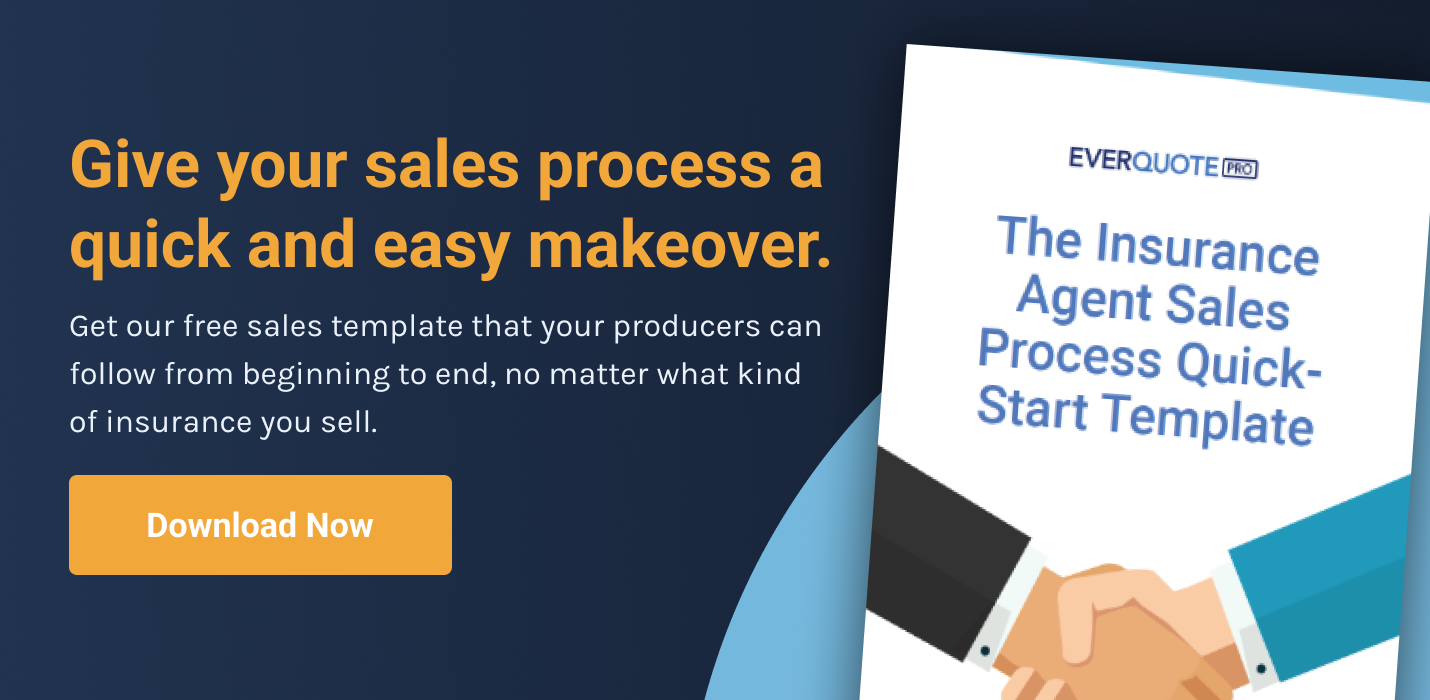- Home»
- EverQuote Pro Blog»
- 5 Non-Negotiable P&C & Life Insurance Selling Skills
5 Non-Negotiable P&C & Life Insurance Selling Skills

As an agent looking for tips and tricks to up your sales and marketing game, you’ve probably run across many articles that offer ideas and things to try out.
This is not one of those articles.
What I’m going to offer you today aren’t things to “try out.”
Instead, these are five non-negotiable P&C and life insurance selling skills. Both selling life insurance myself and working to help hundreds of other agents with EverQuote, I’ve come to realize there are certain skills that are almost prerequisites to being successful in this industry. If you’re an agent buying leads, or if you’re an upline or agency owner who’s not seeing results in the agents you’ve hired, I’d highly recommend doing these things, because your livelihood could depend on it.
1. You must have an abundance mindset.
Selling anything is tough. But the insurance industry—and particularly the world of insurance sales—can chew you up and spit you out if you’re not prepared to give your all. In my experience, an agent must have an abundance mindset to survive and succeed. (You can learn about what an abundance mindset is here.)
Think about it: when prospecting, your only chance to “show” your prospects who you are is how you project your energy over the phone. In my experience, agents who try to sell using fear tactics or who have a scarcity mindset generally do not succeed with leads because prospects can sense their negative energy. As a result, prospects aren’t likely to trust the agent, or have confidence in them.
An agent who doesn’t believe in the process or in themselves needs to take a step back and look at the bigger picture. There are literally thousands (or even millions) of people who need your services! Here are some other essential thoughts and practices that can help you cultivate an abundance mindset:
- Give yourself encouragement. Phrases like, “It’s only a matter of time before they get in contact with me” are so important, because when you feel the scarcity mindset starting to creep up, you’re turning the corner toward failure.
- Practice prayer, meditation, personal disciplines, or mantras. If you believe in a higher power or consider yourself spiritual, think about incorporating it into this aspect of your life. According to numerous academic studies, mindfulness focused practices like meditation can help reduce anxiety and mental stress.
- Surround yourself with the right people. If you are frequently around people who are constantly negative or who subscribe to a scarcity mindset, chances are you’ll adopt some of those attitudes. Instead, choose to interact with people who uplift you and build you up. Attending conferences or gatherings are great ways to surround yourself with others who believe having a good attitude is as important as having the right skills.
2. You must be able to build relationships and rapport quickly over the phone.
In a job that hinges on calling leads and prospecting, knowing how to disarm psychological defense mechanisms in 20 seconds or less is an essential. Those clients and prospects can’t see you—all they can do is hear you.
To get to the point where you can create more buy-in with the leads you have, you’ve got to constantly work on your phone selling skills. (Tweet this!) Unfortunately, I know agents who have never been trained in this—and when you’re prospecting 40 to 50 hours per week, this can be a major point of weakness in your process that will undoubtedly impact your overall success.
Here are some tips to help you build trust and rapport over the phone:
- Take the time to be coached on your process. Get not just one but three or four “coaches” (these can be other agents, District Managers, etc.) who can monitor your voice and provide feedback on how you sound.
- Understand and incorporate the “five Ps” in your conversations: pitch, pace, punch, progress, and pause.
- If you’re an agency owner, you can gamify your agents’ progress by introducing leaderboards, incentives, bonuses, and more.
- Ask your upline or a mentor to help you improve. If they can’t, they should be able to refer you to someone who can.
- Use external resources (like the EverQuote blog and our free whitepapers and guides) to help you learn industry best practices and tips from successful agents.
10 Things Every Agent Should Be Doing (But That Most Aren't) According to Top Agent Perry Olson
3. You must set aside time for personal development.
To be the best in our industry, I think it’s necessary to have a standing appointment each week for personal development, education, and training on life insurance selling skills. Focusing on it for an hour or two each week can really help you learn more and sharpen your skills, so you can work better.
You can use this time to slow down your mind and really think through and define your sales processes. You can also use it to be coached or mentored or develop sales techniques. Having this time and defining growth goals you hope to achieve is what I would consider a non-negotiable strategy, especially for P&C and life insurance agents in growth mode.
4. You must be knowledgeable about your products.
Not only should you be able to answer the “what” about your products, but the “why” as well. If you are able to provide a clear value proposition in five to 10 seconds for anyone who asks you what you do in your business, you are far ahead of many of your peers.
So many agents are one- or two-dimensional with the insurance products they sell—they focus on a small number of products that they have had success with, even if, in the big picture, limiting their focus (on only term life for example), can be detrimental to their career. Agents focused on growth can stand out by constantly educating themselves about what’s new in the industry and within their carrier, as well as legislative issues. (Tweet this!)
5. You must be knowledgeable about your clients and prospects.
The final non-negotiable life insurance selling skill is more difficult to quantify but probably the most important: you must really know about your insurance prospects and clients.
There are two parts to this: what metrics tell us about our clients and what we learn through building trust and relationships.
In our blog, we’ve talked about the importance of identifying your audience and speaking to them through targeted and/or personalized marketing and sales pitches. We’ve also talked about how, through measuring and analyzing data from each step of the marketing and sales cycles, we can identify our best prospects and leads, and do more to target people like them. This is the numbers and data-driven portion of knowing our customers, and it’s imperative that we do this work—you can get more information about this here:
- Insurance Marketing: How To Find The Right Customer For Your Agency
- 3 Most Important KPIs For Insurance Companies In Growth Mode
- How To Tell If Your Insurance Leads Are Turning Into Sales
Once you know what the data says about your clients and prospects, you can begin building a better rapport with them. The best agents are able to gain trust very quickly—some are so skilled they do one-call closes or one-appointment closes. This should be a goal for all agents!
Conclusion
Whether you’re a new agent trying to establish best practices or a tenured agent trying to revamp some tired selling strategies, these P&C and life insurance selling skills aren’t just helpful—they are absolute necessities if you want to rise to the top. Implement them today and watch your agency grow.
Unlock predictable growth with EverQuote.
Our representatives are standing by to help you succeed.
Call 844-707-8800
Weekdays, 9AM-5PM (ET)
Call 844-707-8800
Weekdays, 9AM-5PM (ET)
Accelerate your growth.
Complete the form below or just call 844-707-8800 to learn how we can help you achieve your goals.
By clicking "Get Started", I consent by electronic signature to being contacted by EverQuote, including by automatic telephone dialing and/or an artificial or prerecorded voice (including SMS and MMS - charges may apply), regarding EverQuote for Agents, even if my phone number is listed on a Do Not Call Registry. I also understand that my agreement to be contacted is not a condition of purchasing any goods or services, and that I may call (844) 707-8800 to speak with someone about EverQuote for Agents.
By clicking "Get Started", I affirm that I have read and agree to this website’s Privacy Policy and Terms of Use, including the arbitration provision and the E-SIGN Consent.
* Mandatory fields
 Product Overview
Product Overview Blog
Blog FAQs
FAQs Webinars
Webinars eBooks & Resources
eBooks & Resources